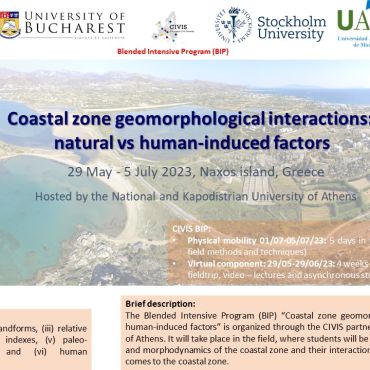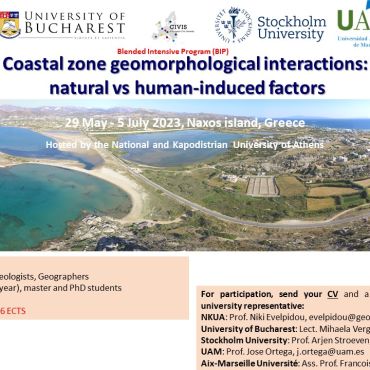Coastal zone geomorphological interactions: natural vs human-induced factors
Take part in field activities on various geomorphological risks in the coastal zone and discover various methods and techniques on coastal geomorphology and coastal hazards
← Back to courses- CIVIS focus area
- Climate, environment and energy
- Open to
-
- Bachelor's
- Master's
- PhD candidates/ students
- Field of studies
-
- Environment & Agriculture
- Environmental sciences, Urbanism, Geography
- Type
-
- Blended Intensive Programme (BIP)
- Course dates
- 29 May - 5 July 2023
The BIP “Coastal zone geomorphological interactions: natural vs human-induced factors” will be hosted by the National and Kapodistrian University of Athens. The physical activities of the BIP will be fieldbased, training students on various geomorphological risks in coastal zone and various methods and techniques on coastal geomorphology and coastal hazards such as storm flood and erosion, beach morphodynamics, coastal engineering including nature based solutions, wave processes, palaeotsunamis, relative sea level changes, coastal erosion, climate change and adaptation. Trainings will also address human-induced impacts on coastal zone.
Main topics addressed
- Coastal processes
- Coastal landforms
- Relative sea-level changes
- Sea-level indexes
- Paleo-environmental reconstructions
- Human interventions.
Learning outcomes
- Training on coastal geomorphological topics
- New competences on coastal geomorphological methods and techniques
- Theoretical thinking and ability to turn theory into practice
- Problem solving ability through application of knowledge
- Search, analysis and composition of data and information by using the necessary technologies
- Teamwork
- Work in interdisciplinary environment
- Respect of the natural environment
| Dates: 29 May - 5 July 2023 | Total workload: 150 hours |
| Format: Blended | ECTS: 6 |
| Location: Naxos, Greece | Language: English |
| Contact: evelpidou@geol.uoa.gr |
Recognition of ECTS depends on your home university.
The blended Intensive Program will be composed of two parts: the virtual component that will be preparatory for the students and the physical mobility that will include field activities and training on new field methods and techniques in coastal geomorphological topics.
Physical mobility
The physical mobility part will be running from 1 to 5 July 2023.
The BIP “Coastal zone geomorphological interactions: natural vs human-induced factors” will be hosted by the National and Kapodistrian University of Athens. The physical activities of the BIP will be field based, training students on various geomorphological risks in coastal zone and various methods and techniques on coastal geomorphology and coastal hazards such as storm flood and erosion, beach morphodynamics, coastal engineering including Nature based solutions, wave processes, palaeotsunamis, relative sea level changes, coastal erosion, climate change and adaptation.
Virtual part
The virtual part will be running from 29 May to 29 June 2023.
The virtual component program will include an introduction to the theoretical background on coastal zone processes, landforms and evolution and a virtual fieldtrip to Naxos Island, where the physical mobility will take place.
Overall, the virtual component program will take place as follows: a) Students will study material available from the open eclass and a mini quiz will take place after that, b) Online presentation will take place in the form of a guided virtual fieldtrip on Naxos Island, followed byan online quiz/test, c) Students will study a story map for Naxos Island, followed by an online quiz/test.
Requirements
This course is open to Bachelor's, Master and PhD students at CIVIS member universities with a background in geology/geoomorhology. Bachelor students should be toward the end of their studies.
NB: Visiting Students - Erasmus Funding Eligibility
To be eligible for your selected CIVIS programme, you must be a fully enrolled student at your CIVIS home university at the time you will be undertaking the programme. Click here to learn more about the eligibility criteria.
Application process
Interested students should apply by filling in the online application form by 28 February 2023.
Students' applications will be evaluated based on their motivation letter and CV.
Assessment
Evaluation of the students on the virtual component will be accomplished through online questionnaires/quizzes. Regarding the physical mobility, students will be evaluated through a presentation they will have to do at the end of the physical mobility.
Blended Intensive Programme
This CIVIS course is a Blended Intensive Programme (BIP): a new format of Erasmus+ mobility which combines online teaching with a short trip to another campus to learn alongside students and professors across Europe. Click here to learn more about CIVIS BIPs.
GDPR Consent
The CIVIS alliance and its member universities will treat the information you provide with respect. Please refer to our privacy policy for more information on our privacy practices. By applying to this course you agree that we may process your information in accordance with these terms.
National and Kapodistrian University of Athens
- Dr. Dr. MSc Niki Evelpidou, Professor, Faculty of Geology and Geoenvironment
- Dr. Anna Karkani, Laboratory Teaching Staff, Faculty of Geology and Geoenvironment
-
Dr. Giannis Saitis, Researcher, Faculty of Geology and Geoenvironment
University of Bucharest
- Dr. Mihaela Verga, Lecturer, Faculty of Geography
- Dr. Alfred Vespremeanu-Stroe, Professor of Physical Geography, Faculty of Geography
- Dr. Ion Florin Tatui, Researcher, Faculty of Geography
Universidad Autónoma de Madrid
- Dr. Jose Ortega, Professor, Department of Geology and Geochemistry
- Dr. Miguel Gomez-Heras, Professor, Department of Geology and Geochemistry
Stockholm University
- Dr. Arjen Stroeven, Professor, Department of Physical Geography
- Dr. Stefan Wastegård, Professor, Department of Physical Geography
- Dr. Britta Sannel, senior lecturer at the Department of Physical Geography
Aix-Marseille Université
- Dr. Francois Sabatier, Associate Professor, Department of Geography, Planning and Environment


